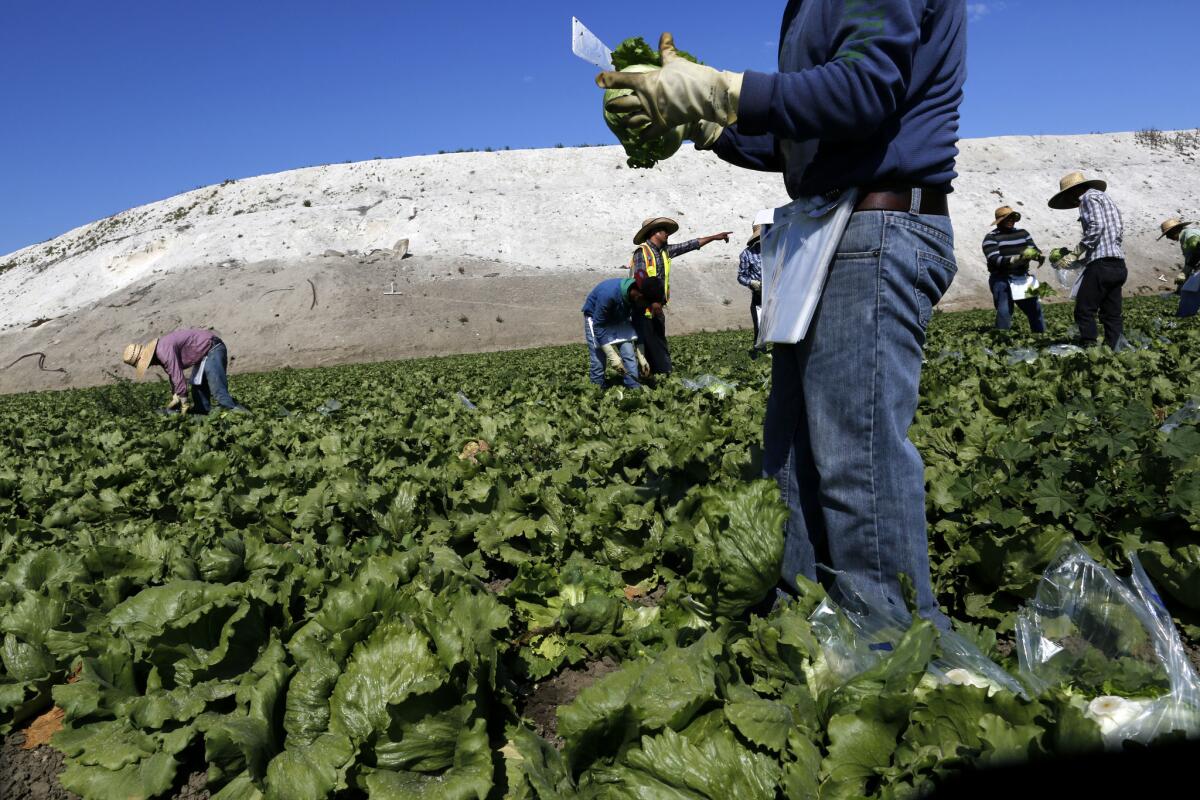Farmworker union underpaid its own organizers, judge rules

- Share via
The union founded on the principle of protecting farmworkers from wage abuses will have to shell out more than $800,000 in back pay to its own organizers, a Monterey County judge ruled this week.
The United Farm Workers America failed to pay two dozen of its organizers for some of the hours they worked, including overtime and meal periods, for more than four years, Monterey Superior Court Judge Thomas Wills ruled Monday.
Including penalties, the ruling on behalf of the plaintiff and a class of 23 other organizers could cost the UFW more than $1 million, even before the judge rules on repayment of legal fees.
Plaintiff Francisco Cerritos, who was fired from the UFW shortly after organizing a UFW employee union in 2013, said he was gratified by the decision, both for himself and for other organizers.
“It’s shameful that a union that says it protects the human rights of farmworkers has been violating the rights of its own employees,” Cerritos said. “It’s a product of the new management of the UFW. They no longer represent the workers.”
Giev Kashkooli, the UFW’s political and legislative director, said the union would appeal.
“We are confident we are going to win on appeal — the decision is flawed and unjust,” Kashkooli said. He accused growers of funding the suit and said Cerritos had received funding from “outside agents” to disrupt the UFW’s activities. That work makes Cerritos unsuitable to represent the UFW workers, Kashkooli said.
Cerritos acknowledged in a January deposition that he had opposed UFW campaigning efforts as part of his employment after leaving the UFW.
Cerritos told The Times this referred to work with the International Assn. of Machinists and Aerospace Workers, which was unseated by the UFW in an election at Foster Farms’ Livingston, Calif., plant last year.
Ana Toledo, one of three attorneys who brought the case on behalf of Cerritos and other organizers, said her firm, Noland, Hamerly, Etienne & Hoss, received no outside help to bring the case.
Kashkooli said the union would revive its argument that the firm has a conflict of interest because it also represents growers who have disputes with the UFW. A similar argument raised by the UFW in a related case was rejected last year by an appellate court.
An organizer who handled the UFW’s collective bargaining activities with Dole Berry North in Monterey County, Cerritos was a founding member of a UFW employee union, La Union Es Para Todos (the union is for everyone). He was fired by the UFW, which cited several disciplinary actions, two weeks after UFW signed a collective bargaining agreement with the newly formed employee union in May 2013, according to court records.
Cerritos filed the suit a year later, saying he was misclassified as exempt from certain wage and hour rules and was owed back wages, according to court records.
The judge agreed Monday, granting Cerritos and the other workers nearly $885,000 and tacking on an additional $235,000 in penalties, Toledo said.
The UFW regularly required Cerritos and 23 other organizers to work more than eight hours a day and 40 hours per week, did not provide paid meal periods after five hours of work and regularly issued pay stubs that did not specify the hours worked, the suit alleged.
Kashkooli would not comment on how the payments and penalties might affect the union’s finances, saying the union would prevail in its appeal.
The UFW reported $3.5 million in assets in 2015, against $1.2 million in liabilities, and a collective bargaining membership of 7,007, according to the U.S. Department of Labor.
Follow me: @LATgeoffmohan
UPDATES:
March 29, 1:45 p.m.: This article was updated with additional details about the plaintiff’s employment after leaving the UFW and with details on the union’s appeal strategy.
This article was originally published March 28 at 9:55 p.m.
More to Read
Inside the business of entertainment
The Wide Shot brings you news, analysis and insights on everything from streaming wars to production — and what it all means for the future.
You may occasionally receive promotional content from the Los Angeles Times.











